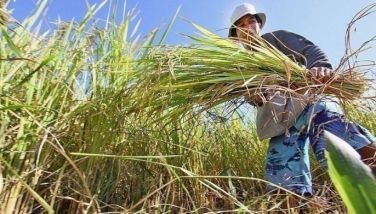Beneficial insects still abound in farms — BPI
December 5, 2004 | 12:00am
Although insecticides are now widely used in farming, many beneficial insects still thrive in farms.
This was found in a three-year study done by researcher Eufrocina Miayo of the Bureau of Plant Industry-La Granja National Crop Research and Development Center (BPI-LGNCRDC) in La Granja City (Negros Occidental).
In a report to BPI director Dr. Hernani Golez, Miayo noted in the study the presence of beneficial insects, among then coccinelid beetles, even at the vegetative stages of mungbean, cowpea, and bush sitao when the bean aphids began infesting the crops. Coccinelid bettle actively feeds on aphids, leafhoppers, and plant hopper nymps.
Other families of insects were found to occur during the reproductive stage of the crops. Moreover, arachnidans (spiders), although not considered insects, are effective predators of destructive leaf-feeding insects and pod borers.
Following are among the beneficial predators and parasites that suppress pests’ infestation of vegetable crops, as reported by BPI’s Baby Ramilo:
• Black-spotted lady bettle, whose larvae voraciously feed on aphids, leafhoppers, and planthopper nymps.
• Wasp – feeds on eggs of bugs.
• Preying mantis – eats months, butterflies, and leaf-feeding insects.
• Jumping spider – feeds on moth, leafhoppers, and small butterflies.
• Ants – eat all kinds of leafhopper and eggs of bugs and leaffolder.
• Dragonfly – feeds on bean pod borer, leafhopper, and leaffolder.
Dr. Golez said that the results of the research are expected to help vegetable and field legumes farmers earn and save more by using these beneficial insects in protecting their crops rather than using the costly pesticides. – RAF
This was found in a three-year study done by researcher Eufrocina Miayo of the Bureau of Plant Industry-La Granja National Crop Research and Development Center (BPI-LGNCRDC) in La Granja City (Negros Occidental).
In a report to BPI director Dr. Hernani Golez, Miayo noted in the study the presence of beneficial insects, among then coccinelid beetles, even at the vegetative stages of mungbean, cowpea, and bush sitao when the bean aphids began infesting the crops. Coccinelid bettle actively feeds on aphids, leafhoppers, and plant hopper nymps.
Other families of insects were found to occur during the reproductive stage of the crops. Moreover, arachnidans (spiders), although not considered insects, are effective predators of destructive leaf-feeding insects and pod borers.
Following are among the beneficial predators and parasites that suppress pests’ infestation of vegetable crops, as reported by BPI’s Baby Ramilo:
• Black-spotted lady bettle, whose larvae voraciously feed on aphids, leafhoppers, and planthopper nymps.
• Wasp – feeds on eggs of bugs.
• Preying mantis – eats months, butterflies, and leaf-feeding insects.
• Jumping spider – feeds on moth, leafhoppers, and small butterflies.
• Ants – eat all kinds of leafhopper and eggs of bugs and leaffolder.
• Dragonfly – feeds on bean pod borer, leafhopper, and leaffolder.
Dr. Golez said that the results of the research are expected to help vegetable and field legumes farmers earn and save more by using these beneficial insects in protecting their crops rather than using the costly pesticides. – RAF
BrandSpace Articles
<
>
- Latest
Latest
Latest
January 10, 2025 - 11:00am
January 10, 2025 - 11:00am
November 9, 2024 - 3:43pm
By E.H. Edejer | November 9, 2024 - 3:43pm
June 9, 2024 - 5:55pm
By Alberto Peña | June 9, 2024 - 5:55pm
May 24, 2024 - 10:00am
May 24, 2024 - 10:00am
May 14, 2024 - 3:43pm
By Ian Laqui | May 14, 2024 - 3:43pm
April 10, 2024 - 5:12pm
By Ian Laqui | April 10, 2024 - 5:12pm
Recommended
























